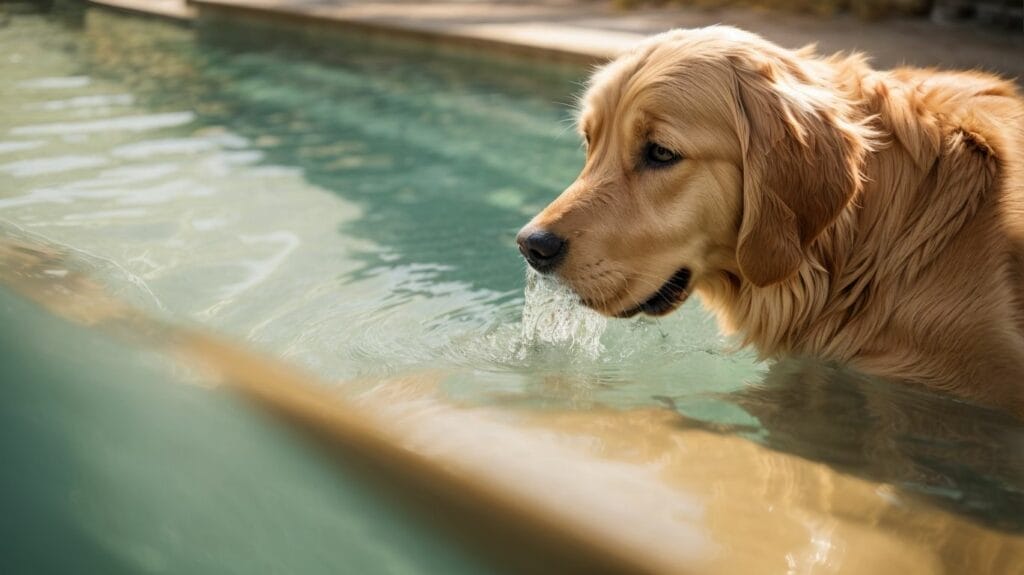Dogs, like humans, need water to survive and stay hydrated. However, there may be instances where dogs exhibit excessive drinking behavior, leading to the question of whether they drink a lot of water before they die. It’s important to understand the reasons behind their increased water consumption and the potential health problems associated with it.
There are several reasons why dogs may drink a lot of water:
1. Natural Thirst: Dogs may drink more water due to factors such as higher activity levels or warmer weather.
2. Environmental Factors: Dogs may drink more water if they are exposed to a dry or hot environment.
3. Increased Activity or Exercise: Dogs engaged in strenuous activities or exercise may consume more water to compensate for fluid loss.
Signs of excessive drinking in dogs can indicate underlying health issues. These signs include frequent urination, accidents in the house, constant thirst, changes in appetite, and weight loss or gain.
When excessive drinking in dogs is persistent and accompanied by other symptoms, it may be indicative of certain health problems. These include diabetes, kidney disease, urinary tract infection, or Cushing’s Disease.
It’s important to be aware of when excessive drinking in dogs should be a cause for concern. If your dog’s drinking habits suddenly change and they are consuming excessive amounts of water consistently, it may be a sign of an underlying health issue. In such cases, it is advisable to seek veterinary care to determine the cause and appropriate treatment.
Diagnosing excessive drinking in dogs involves veterinary examination, including blood and urine tests, to assess organ function and check for underlying conditions.
Treatment and management of excessive drinking in dogs depend on the underlying cause. It may involve medication, dietary changes, or lifestyle modifications. It’s crucial to follow the veterinarian’s guidance to ensure the well-being of your pet.
Prevention of excessive drinking involves providing access to fresh, clean water at all times and monitoring your dog’s water intake. If you notice any sudden changes or excessive drinking patterns, contact a veterinarian for further guidance and to rule out any potential health concerns. By being vigilant and proactive, you can help ensure your dog’s health and well-being.
Key takeaways:
- Dogs may drink a lot of water due to natural thirst, environmental factors, or increased activity. It is important to understand the reasons behind excessive drinking in dogs.
- Excessive drinking in dogs can be a sign of health problems such as diabetes, kidney disease, urinary tract infection, or Cushing’s Disease. These conditions should be identified and treated by a veterinarian.
- Suppose a dog is constantly drinking a lot of water, experiencing frequent urination, accidents in the house, changes in appetite, or weight loss/gain. In that case, it is crucial to seek veterinary care for proper diagnosis and treatment.
Why Do Dogs Drink a Lot of Water?
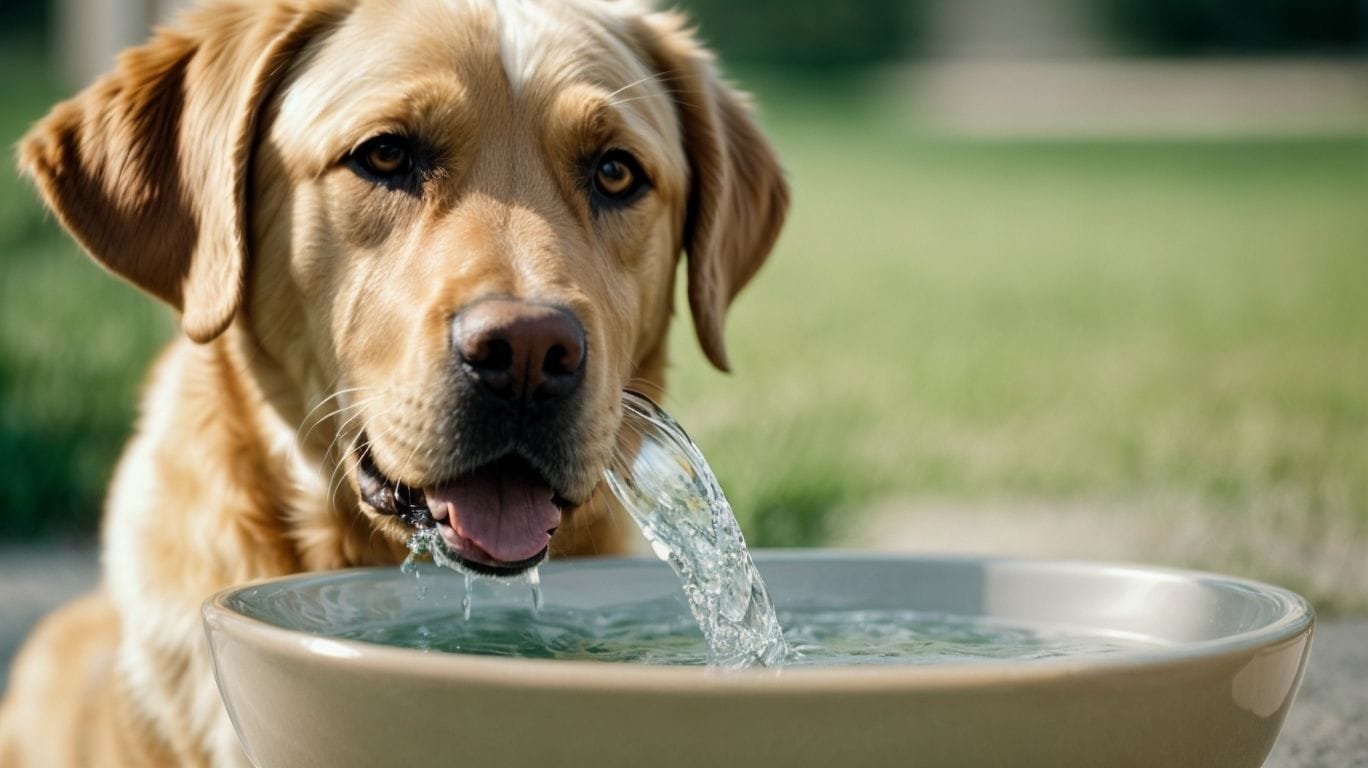
Photo Credits: Petnarnia.Com by Bryan Thomas
Have you ever wondered why your furry friend seems to have an endless thirst? In this intriguing section, we’ll uncover the reasons behind a dog’s tendency to drink a lot of water. From exploring their natural thirst instincts to the influence of environmental factors and increased activity levels, we’ll discover the fascinating factors that contribute to a dog’s hydration habits. Prepare to unravel the mysteries surrounding our canine companions’ insatiable need for water.
Natural Thirst
Dogs have a natural and essential behavior of experiencing thirst. Their instinct drives them to drink water in order to stay hydrated and function properly. Satisfying their natural thirst is crucial for dogs as it plays a role in regulating their body temperature, aiding in digestion, and supporting overall health. Factors such as increased activity, warmer environments, or post-exercise can trigger dogs to show signs of their natural thirst. Providing clean and fresh water is of utmost importance to ensure that dogs can quench their natural thirst whenever they need to. This regular access to water not only helps prevent dehydration but also promotes their well-being.
Environmental Factors
- Hot weather and other environmental factors can contribute to dogs drinking a lot of water. Dogs may drink more water to stay hydrated and cool in hot climates.
- Humidity is another environmental factor that can make dogs feel more thirsty and lead to increased water intake.
- During the winter months, indoor heating can cause dry air, which may result in increased thirst in dogs.
- Exercise is also an important environmental factor that can cause dogs to drink more water, especially after vigorous physical activity.
Fact: Dogs have a higher water requirement compared to humans because their bodies are made up of 80% water, while ours are only around 60%.
Increased Activity or Exercise
Increased activity or exercise can cause dogs to drink more water to stay hydrated. Here are some steps to manage their water intake:
- Offer water before and after physical activity to prevent dehydration.
- Provide access to fresh water during breaks in exercise sessions.
- Monitor your dog for signs of fatigue or overheating during exercise.
- Consider using a portable water bottle or bowl for outdoor activities.
- Please consult with a veterinarian to determine the appropriate amount of water your dog needs based on their activity level and breed.
Signs of Excessive Drinking in Dogs
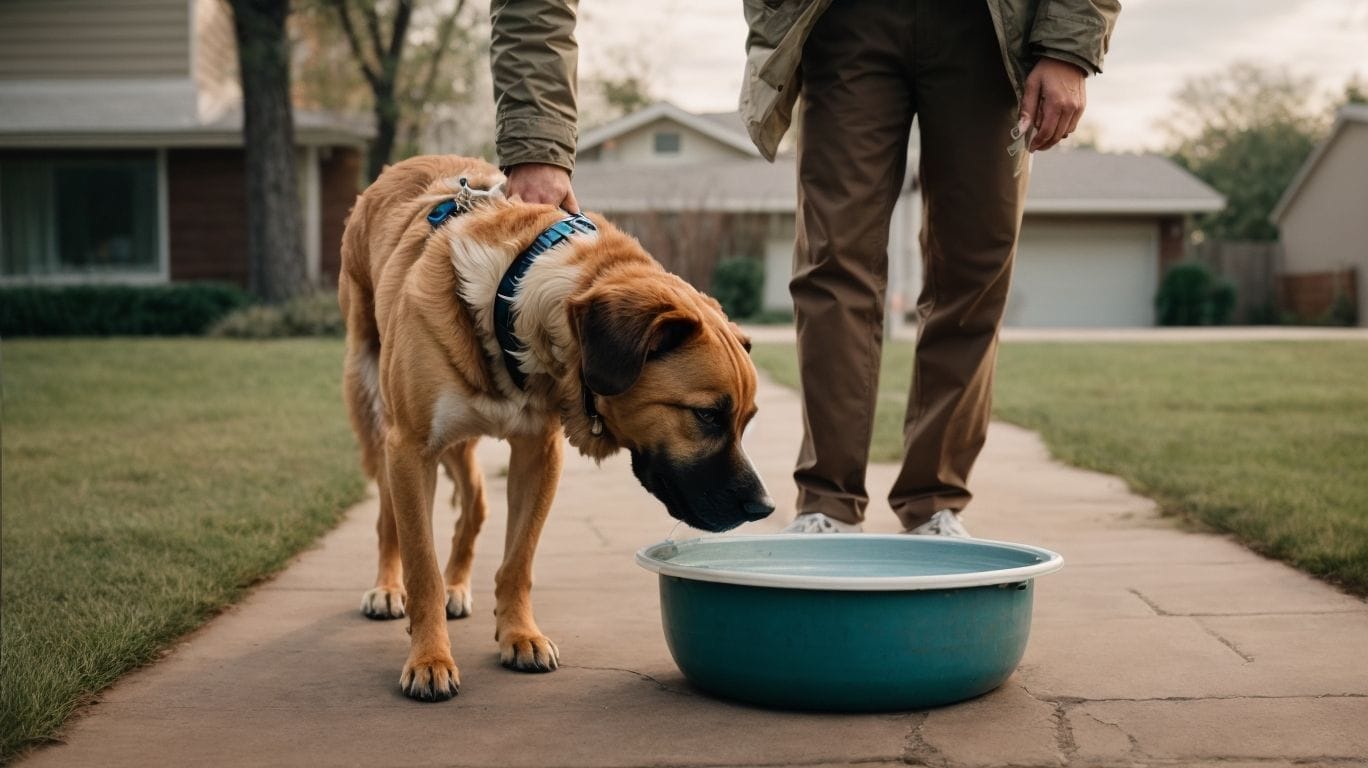
Photo Credits: Petnarnia.Com by Ralph Hall
If you’ve noticed your furry friend quenching their thirst more frequently than usual, you might be wondering what’s going on. In this section, we’ll dive into the signs of excessive drinking in dogs. From frequent bathroom trips to accidents in the house and an unquenchable thirst, we’ll unravel the clues that could indicate an issue with your pup’s water intake. Keep an eye out for changes in appetite and unexpected weight fluctuations, too. Let’s decode what your dog’s drinking habits could be telling you!
Frequent Urination
Various factors can cause frequent urination in dogs. It is important to monitor your dog’s water intake and bathroom habits to identify any changes. Some common reasons for frequent urination include urinary tract infections, diabetes, kidney disease, and Cushing’s Disease. If your dog is experiencing more frequent urination than usual, it is advisable to consult your veterinarian for a proper diagnosis and treatment plan. Suggestions for managing frequent urination may include providing ample opportunities for outdoor bathroom breaks and ensuring that your dog has access to fresh water throughout the day.
Accidents in the House
Accidents in the house can indicate that your dog is consuming excessive amounts of water. This increased water consumption, medically termed as polydipsia, may stem from various factors such as diabetes or kidney disease. If your dog is experiencing accidents inside the house and also exhibiting other symptoms like frequent urination, constant thirst, or changes in appetite, it could potentially point toward an underlying health issue. It is crucial to seek veterinary care in order to effectively diagnose the root cause and devise an appropriate treatment plan. By properly managing and taking preventive measures, in addition to maintaining regular communication with your veterinarian, you can effectively address the issue of accidents in the house.
Constant Thirst
Dogs experiencing a constant thirst might be indicating the presence of underlying health issues. Some potential causes for this condition may include diabetes, kidney disease, urinary tract infection, or Cushing’s Disease. If your dog is consistently thirsty and also displaying symptoms such as frequent urination, appetite changes, or fluctuations in weight, it is crucial to seek veterinary care promptly. The diagnosis of excessive drinking in dogs typically involves conducting blood tests, urinalysis, and imaging. The appropriate treatment and management plan will depend on the specific underlying cause. In order to prevent potential health problems, it is essential always to provide your dog with fresh water and closely monitor their water intake. If you observe any worrisome changes, you are advised to consult a veterinarian for guidance.
Changes in Appetite
Changes in appetite in dogs can be a sign of various health issues. It is crucial to pay attention to any significant changes, such as increased or decreased appetite, as they may indicate underlying problems. For instance, if your dog is consuming a large amount of water but displaying a decreased appetite, it could potentially be a sign of conditions like diabetes or kidney disease. Conversely, an amplified appetite accompanied by excessive water intake could be a symptom of Cushing’s Disease. If you observe any alterations in your dog’s appetite, it is advisable to seek advice from a veterinarian for a proper diagnosis and treatment.
Weight Loss or Gain
Weight loss or gain in dogs can be a sign of underlying health issues. Here are some factors to consider:
1. Diet: Changes in weight can be linked to the type and amount of food your dog consumes.
2. Activity level: If your dog’s activity level has decreased, they may be experiencing weight gain. Conversely, increased activity can lead to weight loss.
3. Metabolism: Some conditions, like hypothyroidism, can slow down metabolism and result in weight gain.
4. Illness: Weight loss may indicate an underlying medical condition, such as diabetes or gastrointestinal issues.
5. Age: Older dogs may experience weight gain due to reduced exercise and a decrease in muscle mass.
It’s important to monitor your dog’s weight and consult a veterinarian if you notice significant changes in weight loss or gain.
When Drinking a Lot of Water Could Indicate Health Problems
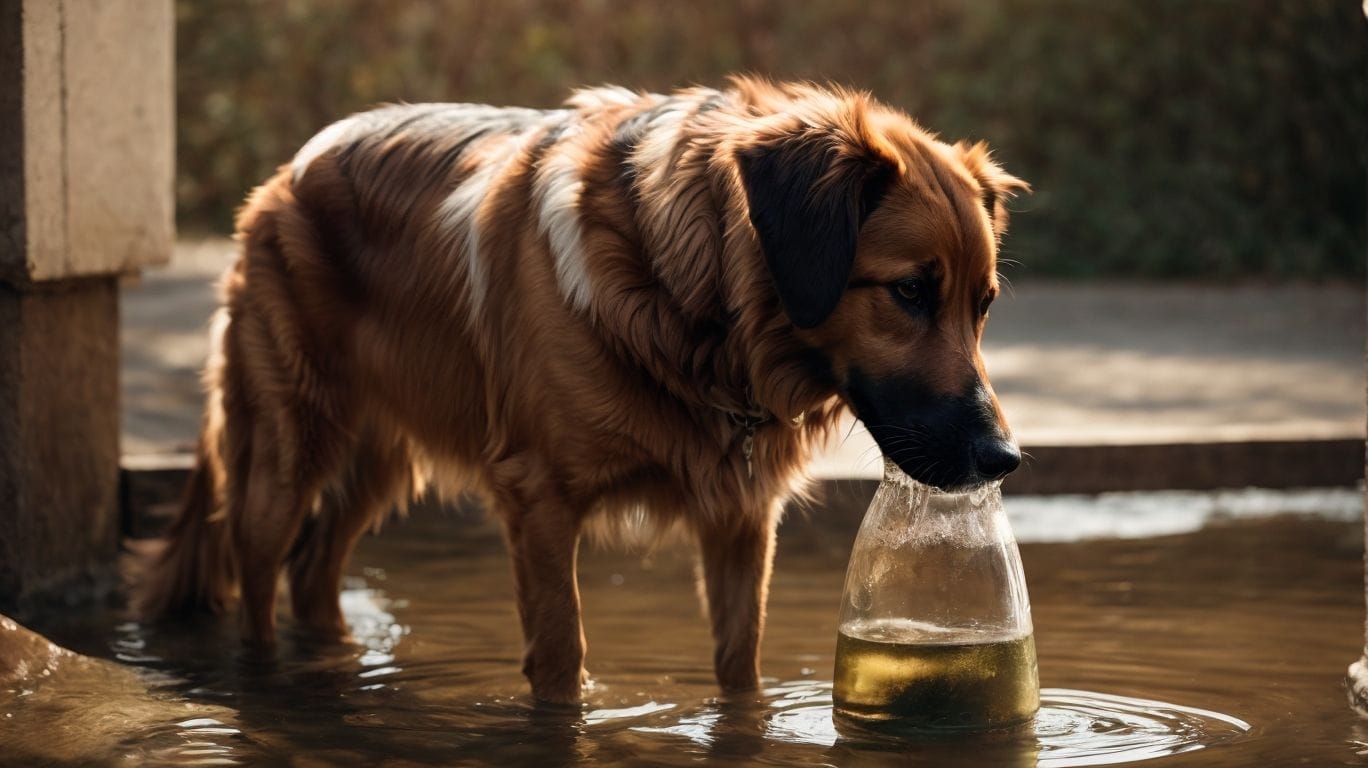
Photo Credits: Petnarnia.Com by George Moore
When dogs start drinking a lot of water, it might be a sign of underlying health issues. In this section, we’ll take a closer look at the potential causes behind this excessive thirst. From diabetes to kidney disease, urinary tract infections to Cushing’s Disease, we’ll explore the various health conditions that could be affecting our furry friends. So, let’s dive in and uncover the reasons why our dogs might be guzzling down more water than usual.
Diabetes
In dogs, diabetes can lead to excessive drinking of water, which is known as polydipsia. This condition occurs due to high blood sugar levels that cause increased thirst in dogs. It is essential to monitor your dog’s water intake and observe other symptoms like frequent urination and changes in appetite. If you suspect diabetes, consult your vet for a proper diagnosis and treatment plan. Managing diabetes in dogs usually involves insulin therapy, a controlled diet, and regular exercise. Early detection and proper management can help improve your dog’s quality of life.
Kidney Disease
Kidney disease in dogs is a significant condition that can lead to an increased intake of water. It is crucial to carefully monitor your dog’s water consumption and remain attentive to other indicators such as frequent urination, changes in appetite, and fluctuations in weight. Various factors, including genetics, infections, or exposure to toxins, can trigger kidney disease. The timely detection and treatment of kidney disease are vital in managing this condition in dogs. If you suspect that your dog may be suffering from kidney disease, it is essential to seek guidance from a veterinarian for an accurate diagnosis and appropriate treatment. Pro-tip: Ensuring that your dog has access to fresh and uncontaminated water can aid in the prevention of kidney problems.
Urinary Tract Infection
A urinary tract infection (UTI) can cause dogs to experience increased thirst and frequent urination. If you suspect that your dog may have a UTI, there are several steps you can take to address the issue:
Observe your dog’s behavior: Pay attention to any signs that may indicate a UTI, including straining to urinate, the presence of blood in the urine, and any signs of discomfort.
Ensure hydration: Provide your dog with clean and fresh water to aid in flushing out bacteria from the urinary tract.
Consult a veterinarian: Schedule an appointment with your vet to confirm the presence of a UTI and to receive the appropriate treatment.
Undergo urinalysis: Your vet may conduct a urinalysis to identify the specific bacteria causing the infection and prescribe antibiotics accordingly.
Administer medication: Follow your vet’s instructions on how to administer medication in order to clear the infection effectively.
Prevention measures: Help prevent UTIs by encouraging your dog to urinate frequently, promoting regular exercise, and maintaining good hygiene practices.
Monitor progress: Keep a close eye on your dog’s symptoms and promptly report any changes to your vet.
Cushing’s Disease
Cushing’s Disease in dogs is a condition caused by excessive levels of cortisol, a hormone produced by the adrenal glands. It can lead to increased thirst and urination, among other symptoms. Proper diagnosis by a veterinarian is crucial, as other conditions may have similar signs. Treatment options include medication, dietary changes, and managing underlying health issues. Timely veterinary care can help improve the quality of life for dogs with Cushing’s Disease. Fun Fact: Cushing’s Disease is named after the neurosurgeon Harvey Cushing, who first described the condition in humans.
When Should You Be Concerned?
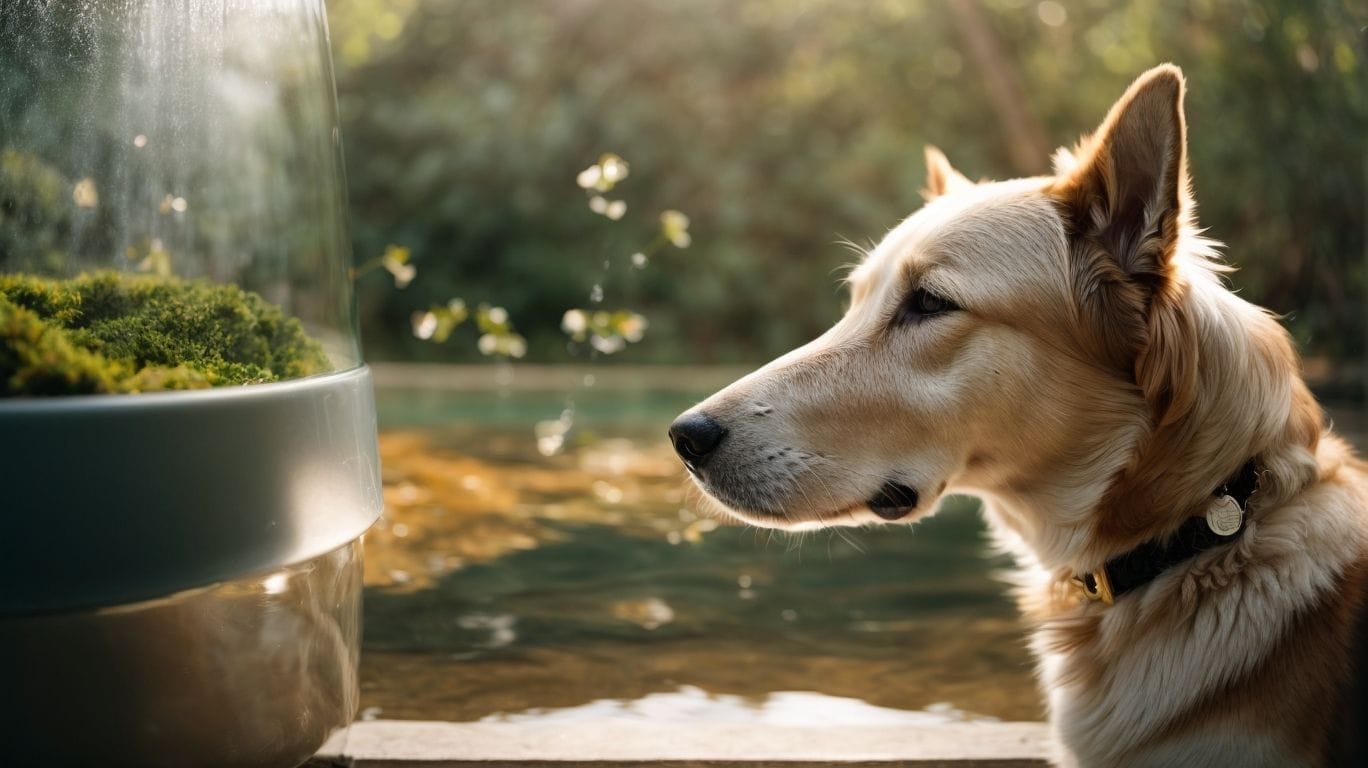
Photo Credits: Petnarnia.Com by Anthony Martinez
If your dog is drinking an unusually large amount of water, it may be a cause for concern. This is especially true if it is accompanied by other symptoms such as frequent urination, weight loss, or changes in appetite. Excessive thirst can be a sign of various health issues, including diabetes, kidney disease, or hormonal imbalances. It’s important to monitor your dog’s water intake and consult a veterinarian if you notice any concerning changes in their drinking habits. Remember, early detection and treatment can lead to better outcomes for your furry friend. When Should You Be Concerned?
When to Seek Veterinary Care?
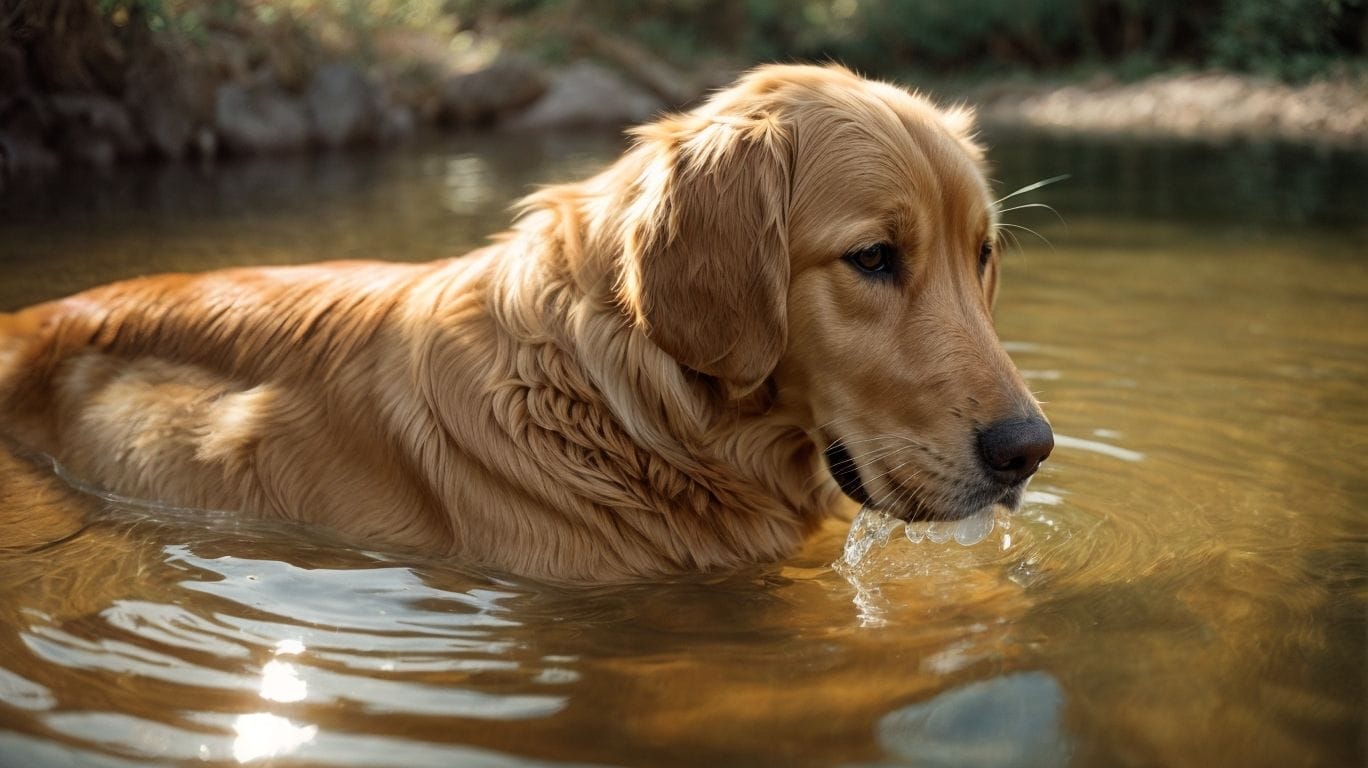
Photo Credits: Petnarnia.Com by Jesse Green
When it comes to the well-being of your furry friend, knowing when to seek veterinary care is crucial. Pay attention to any sudden changes in behavior, appetite, or water intake. If your dog is drinking a lot of water before they die, it could be a sign of a serious underlying health issue. Other signs indicating a need for veterinary care include vomiting, diarrhea, difficulty breathing, or sudden weight loss. It’s always better to be safe than sorry, so trust your instincts and consult a veterinarian promptly if you have any concerns. Stay informed about common health issues in dogs, schedule regular check-ups and vaccinations, maintain a healthy diet and exercise routine, and keep an eye on any changes in your dog’s behavior or appetite. Remember, seeking veterinary care when needed is essential for the optimal well-being of your beloved pet.
How Is Excessive Drinking in Dogs Diagnosed?

Photo Credits: Petnarnia.Com by Keith Allen
How Is Excessive Drinking in Dogs Diagnosed?
Excessive drinking in dogs, known as polydipsia, can be diagnosed through a series of tests conducted by a veterinarian. To determine how excessive drinking is diagnosed in dogs, the first step is to rule out common causes such as diabetes, kidney disease, or hormonal imbalances. Blood and urine tests are usually performed to check for abnormal glucose and electrolyte levels. Additionally, imaging techniques like ultrasound or X-rays may be used to examine the organs. Once a diagnosis is made, appropriate treatment options can be administered, which may include medication, dietary changes, or surgery if necessary. If you notice your dog drinking excessively, it is essential to seek veterinary care promptly to determine the underlying cause and provide appropriate treatment.
Treatment and Management
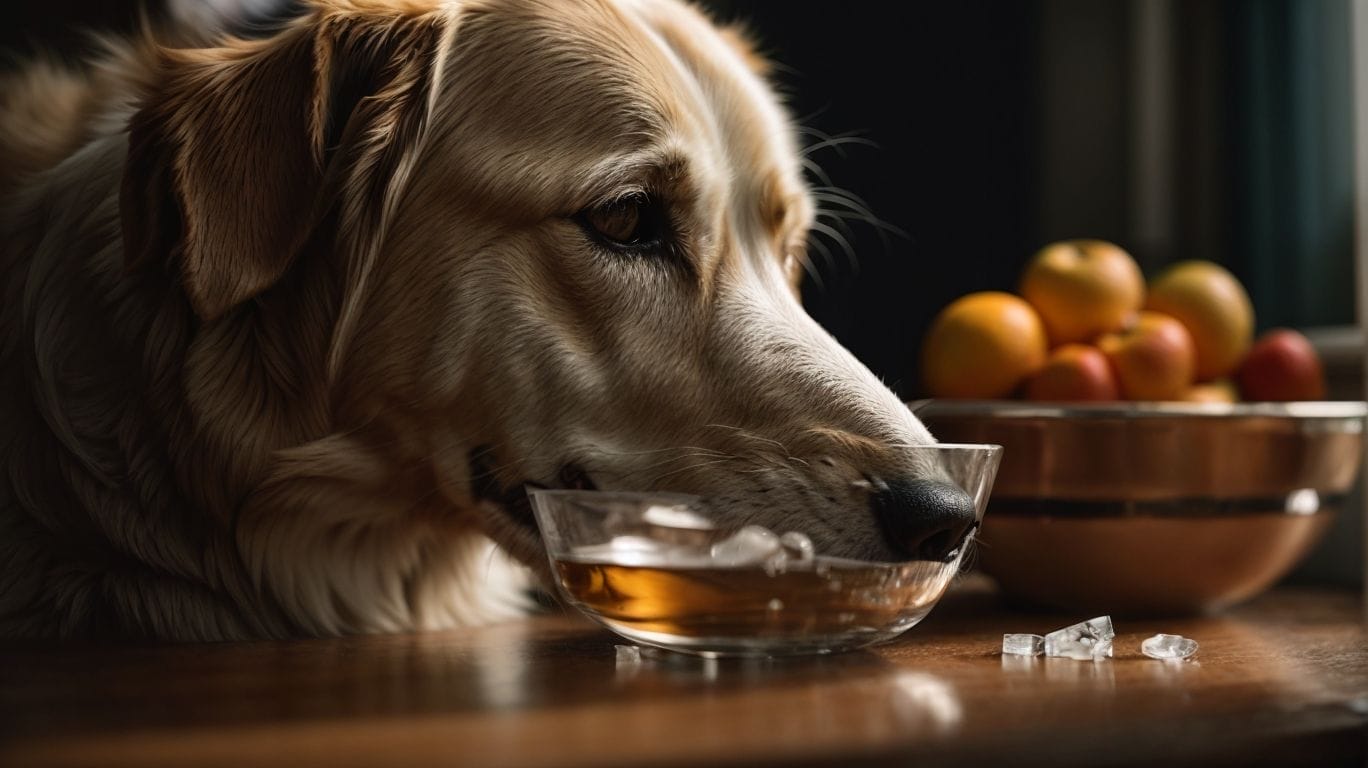
Photo Credits: Petnarnia.Com by Donald Martin
Treatment and management are crucial when dealing with dogs requiring increased water intake. To address this issue, it is essential to start with a veterinary assessment, which includes a thorough examination. This will help determine the underlying cause of excessive thirst and recommend appropriate treatment. Medication might be necessary depending on the diagnosis, especially for conditions like diabetes or kidney disease, which can contribute to increased water consumption. Additionally, diet modification may be required, including switching to a prescription diet specifically formulated for managing certain medical conditions.
Regular monitoring of water intake, urine output, and bloodwork is essential to ensure the effectiveness of treatment and make any necessary adjustments. It is through these measures that the story of my neighbor’s dog, Max, can be told. Max began drinking an excessive amount of water, leading to a visit to the vet. It was discovered that Max had developed diabetes. Nonetheless, with effective treatment and management, including medication and a specialized diet, Max’s water intake returned to normal. Consequently, he regained his energy and zest for life.
Prevention and When to Contact a Veterinarian
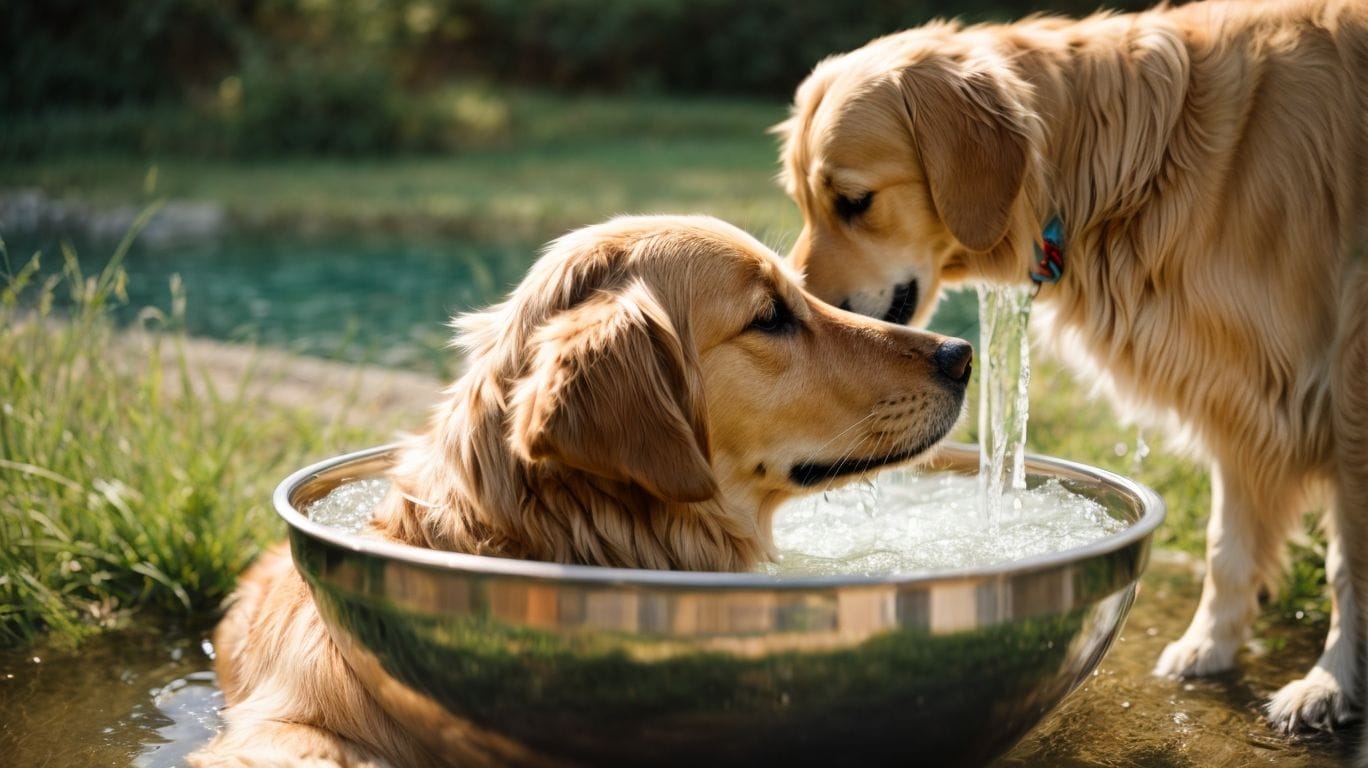
Photo Credits: Petnarnia.Com by Dylan Lopez
When it comes to the hydration needs of dogs, prevention is key to ensuring their well-being. It is important to provide fresh water at all times and monitor their water intake. Dogs should not be excessively thirsty, as this could indicate a health issue. If you notice your dog drinking an abnormal amount of water or showing signs of dehydration, it is crucial to contact a veterinarian immediately for prevention. Regular check-ups and preventative care, such as vaccinations and dental cleanings, can also help detect any underlying conditions that may affect their water consumption. By staying vigilant and seeking prompt veterinary attention, you can ensure your furry friend stays healthy and hydrated and knows when to contact a veterinarian.
Some Facts About “Do Dogs Drink a Lot of Water Before They Die?”:
- ✅ Excessive thirst in senior dogs can be a sign of underlying health issues. (Source: Our Team)
- ✅ Excessive thirst, also known as polydipsia, should be addressed promptly in dogs. (Source: Our Team)
- ✅ Common causes of excessive thirst in dogs include diabetes, kidney disease, Cushing’s syndrome, and pyometra. (Source: Our Team)
- ✅ Excessive thirst in dogs can also be caused by cancer, dehydration, diarrhea, fever, heatstroke, infection, liver disease, medications, parasites, and vomiting. (Source: Our Team)
- ✅ Prompt medical intervention is necessary to address excessive thirst in dogs and increase chances of recovery. (Source: Our Team)
